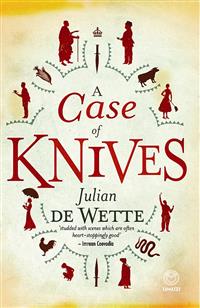Clever social commentary in A Case of Knives
Julian De Wette’s latest novel, A Case of Knives, is a cuttingly smart take on South Africa in the 1960s...

By Leigh Andrews
From the intriguing twists and ramifications of seemingly innocent, well thought-out acts that were unintentionally racist, to the witty disclaimer of the book, asking for objections to any of the names and settings in the work of fiction to be lodged with the registrar in triplicate, accompanied by an affidavit in triplicate – and if the objection is deemed frivolous, you will be prosecuted to the fullest extent of the law, so best you keep your mouth zipped!
South Africa in the 1960s. Yes, it’s a topic that’s been beaten to death before, but De Wette has a refreshing take, and the 286 pages fly by, leaving you to pause and reflect on the gripping conclusion. Not just about social and racial injustice, the novel is masked as the coming-of-age tale of young Enoch, who is the only child of embarrassing, overprotective Coloured parents. His grandfather, Hannes Pretorius, is the gardener of the prime minister’s residence, Wepener, now inhabited by Prime Minister Schoon’s son, Dries, and his British wife, Alison, who has ’different’ ideas that don’t gel too well with her in-laws. It is Oupa Hannes who is the true protagonist of the tale, weaving together threads of horseracing; re-classification and eviction notices; the dynamics of marriage; religious misconceptions; witch doctors and the state of education in the homelands; and frustrating red tape bureaucracy at any government department - whether applying for a pass book so as to not be arrested for being ‘out of one’s homeland’ or attempting to be racially re-classified… again. (I will not dwell on this as it is a juicy theme in the book, ultimately leading to the downfall of ‘holier than thou’ butler of Wepener, Mr Molineux.)
The cast of characters is absolutely believable, from snotty white teenager, Caroline, who is visiting from the UK and purposefully rebelling against her aunt Alison; the prime minister’s granddaughter, Hanneli, who doesn’t discriminate among the house staff; and the dogs, Byron and Augusta Leigh, always ready for a walk around the property; to Oupa Hannes’ betting partner, Mr Salie, a tailor from District Six. As De Wette himself is Coloured, the colourful use of English by the house staff provided me with much amusement, especially from Clara, originally Afrikaans but proudly speaking English now: “… don’t come and talk rubbish,” is a good example.
De Wette’s often-misguided Prime Minister, Sybrand Schoon, held my interest in that while putting forth suggestions and laws that did not go down well with his black counterparts, he honestly believed he was acting in their best interests… and one of his most trusted confidants is Khotso, the many-wived Xhosa chief who keeps him supplied with ‘muti’ on the sly.
An absolutely riveting tale.
A Case of Knives is an Umuzi-Randomhouse print.
About the author
This is only some dummy text because I dont really know what to write. This is only some dummy text because I dont really know what to write. This is only some dummy text because I dont really know what to write.